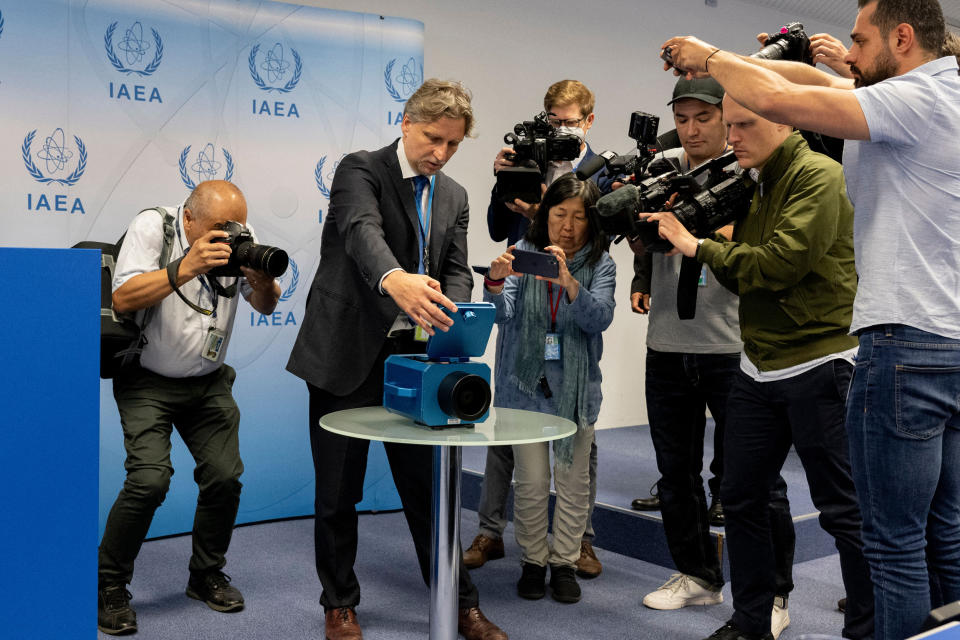Iran removing 27 U.N. cameras monitoring nuclear activity in possible 'fatal blow' to reviving deal, U.N. says
The U.N. atomic watchdog agency said Thursday that Iran has begun removing 27 cameras monitoring its nuclear activity, a move that could prevent international inspectors from gaining a clear picture of Tehran’s uranium enrichment work.
The action could deal a potentially “fatal blow” to efforts to revive a 2015 nuclear deal that was designed to prevent Iran from developing nuclear weapons, Rafael Mariano Grossi, the director-general of the International Atomic Energy Agency (IAEA), said at a news conference in Vienna.
“This, of course, poses a serious challenge to our ability to continue working there,” Grossi said, adding Iran had informed the IAEA of its plans in a “succinct” statement.
It appeared Iran intended to remove the bulk of the cameras and other monitoring gear installed as part of the 2015 nuclear agreement between Tehran and world powers, according to Grossi. Without cameras in place, Iran could divert centrifuges used for uranium enrichment to other unknown locations, he said.
Iran took the step after the IAEA’s 35-nation board of governors on Wednesday night voted to censure Iran over its failure to provide “credible” explanations about the origins of nuclear material found at three undeclared sites. The resolution had overwhelming backing and only Russia and China opposed it.
Before the censure vote, Iran said it had turned off two U.N. cameras and warned it could take further measures, accusing the IAEA of failing to recognize Tehran’s “goodwill” in its approach to the agency. But Iran did not issue a public announcement about removing cameras along the lines that Grossi described.
Iran’s U.N. mission told NBC News in an email that more than 80 percent of the IAEA’s cameras in Iran “will continue to operate as before.”
Secretary of State Antony Blinken said Iran should have offered more cooperation with the IAEA after the censure vote but instead was threatening “further nuclear provocations and further reductions of transparency.”
Such action would only complicate efforts to restore the 2015 nuclear deal, Blinken said in a statement. “The only outcome of such a path will be a deepening nuclear crisis and further economic and political isolation for Iran. We continue to press Iran to choose diplomacy and de-escalation instead,” he said.
Iran condemned the censure resolution from the IAEA board as “a political, incorrect and unconstructive action,” according to a foreign ministry statement. Iran has cooperated in a constructive way with the IAEA but a recent report from the agency was “unbalanced” and the censure resolution “will only weaken” Tehran’s cooperation with the agency, it said.
This week, Grossi said Iran was close to having enough enriched uranium to produce an atomic bomb.
In a statement delivered Wednesday at the IAEA board of governors, the U.S. ambassador to the agency, Laura Holgate, said the U.S. was not seeking to raise tensions by backing the censure resolution against Iran, but that Washington had an obligation to hold Tehran accountable given its stance toward inspectors.
“We are not taking this action to escalate a confrontation for political purposes. We seek no such escalation. The Director General’s report to this Board was crystal clear about the status of the outstanding issues. Based on that report, it is also clear that Iran’s insufficient cooperation — and the longstanding deficit in verification assurance this has created — requires us all to act,” she said.
Britain, France and Germany said in a statement that Tehran was preventing the IAEA inspectors from carrying out their work to verify if Iran’s nuclear activity was for peaceful purposes.
“Iran’s failure to cooperate presents a challenge to the nonproliferation regime: it is essential that the IAEA is able to fully account for nuclear material as per its mandate,” the countries said.

Iran says its nuclear program is for purely peaceful purposes.
The 2015 nuclear accord, known as the Joint Comprehensive Plan of Action or JCPOA, imposed restrictions on Iran’s nuclear program in return for an easing of U.S. and international economic sanctions on Tehran. In 2018, then-President Donald Trump withdrew the U.S. from the deal, reimposed sanctions and introduced new sanctions. Since President Joe Biden entered office, the U.S. and other world powers have tried to revive the accord in negotiations in Vienna. The talks have stalled in recent months.
The 2015 deal includes an IAEA inspections regime to allow U.N. experts to monitor if Iran was undertaking work that could be used for a possible nuclear weapon.

